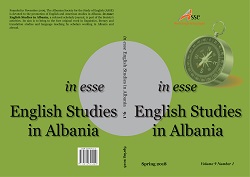Nostalgia and Englishness in Julian Barnes’s England, England
Nostalgia and Englishness in Julian Barnes’s England, England
Author(s): Aylin AttilaSubject(s): Language and Literature Studies, Studies of Literature, Theory of Literature
Published by: Albanian Society for the Study of English
Keywords: Julian Barnes; ‘England, England’; reflective and restorative nostalgia; personal and collective memory; Contemporary English Novel;
Summary/Abstract: This article focuses on England, England (1998), a late twentieth-century novel about memory and nostalgia. Centering on Englishness, the novel plays with traditional ideas of national identity and stereotypes that construct collective memory. Moreover, Barnes’s novel addresses the circulation of these stereotypes, the commodification of the nation and the relationship between personal and national identities. The novel provides an example analysis of the construction of national identity and a satirical portrayal of the artificial invention of nationhood; yet, it gives the idea that despite its inauthenticity, there is a human need to construct a collective memory whose stability is held by history. The theme park in the novel, as a nostalgic project, is an assembly of working cultural motifs. There, the nation is commodified and represented as a marketable, reified object and thereby converted into a series of saleable symbols. Svetlana Boym (2001) defines two kinds of nostalgia: the restorative and the reflective. Restorative nostalgia stresses nostos (“to return home”) and “attempts a trans-historical reconstruction of the lost home.” As she defines (Boym 2001, 41) it, “restorative nostalgia manifests itself in total reconstruction of monuments of the past, while reflective nostalgia lingers on ruins, the patina of time and history, in the dreams of another place and time.” Though nostalgia has many different explanations for different disciplines, the shared feeling is defined as a yearning for the past. With modernity, the pathological paradigm of nostalgia faded away and became connected to the sentimentalization of the past, to feelings of loss and attachment. Modernity accused nostalgia of being repressing and resisting critique and change. In postmodern world and literature, nostalgia appeared as a defence to discuss and critisize the rapid pace of modern life. This article proposes that, similarly, Barnes’s novel, England, England, laments the fact that it is not possible to identify an authentic place of origin for the nation or for personal memory. In this nostalgic version of England, the traces of the past are curiously hollow. Ironically, in the attempt to invent a national identity, elusive memories and distorted views of history come together to trace Englishness.
Journal: in esse: English Studies in Albania
- Issue Year: 9/2018
- Issue No: 1
- Page Range: 29-41
- Page Count: 13
- Language: English

